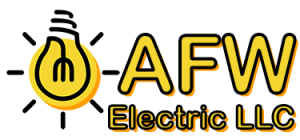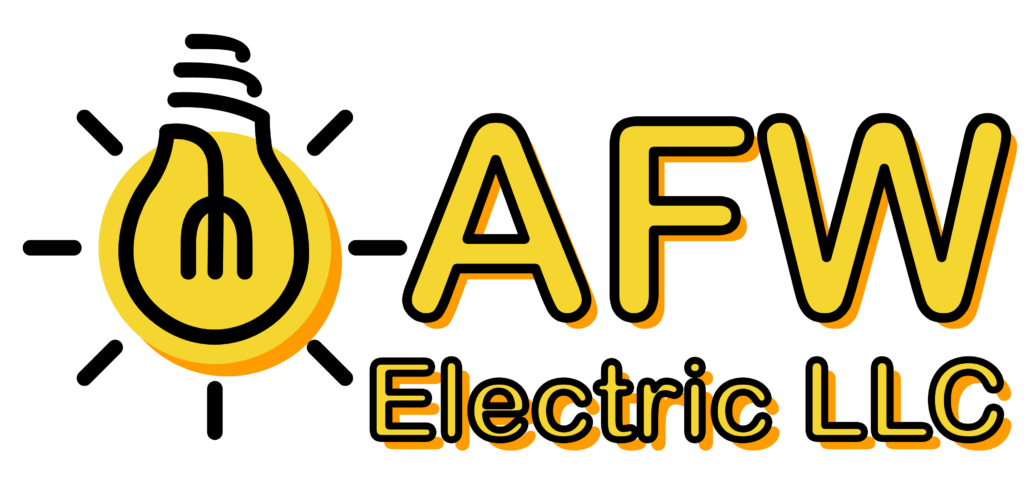We get it – electrical work can be confusing! From flickering lights to EV charger installations, there’s a lot to know. But don’t worry, we’re here to help. AFW Electric LLC has put together this FAQ page to answer your burning questions and shed light on all things electrical.
Whether you’re a homeowner, business owner, or just curious about electrical services, you’ll find valuable information here. We’ve compiled a list of common questions we receive from our clients, along with our expert answers.
Free Estimates
Table of Contents
Service & Panel Upgrades Questions
Why should I consider upgrading my electrical panel?
An electrical panel upgrade may be necessary to accommodate increased electrical demands from modern appliances and devices, improve safety by reducing the risk of electrical fires, and enhance the overall value and functionality of your property.
What are the signs that my electrical panel needs to be upgraded?
Some common signs include flickering lights, frequently tripped breakers, burning smells near the panel, a panel that’s warm to the touch, or if your home still has fuses instead of breakers. If your home is older and hasn’t had an electrical upgrade, it might be time to consider one.
Will a panel upgrade disrupt my daily life or business operations?
While a panel upgrade does require temporarily shutting off power to your home or business, a qualified electrician can typically complete the work efficiently to minimize disruption. The duration of the outage will depend on the complexity of the upgrade.
How much does it cost to upgrade an electrical panel?
The cost of an electrical panel upgrade can vary widely depending on several factors, such as the size of the panel, the amperage rating, the complexity of the installation, and your location. It’s best to get a quote from a licensed electrician to determine the specific cost for your project.
How long does it take to upgrade an electrical panel?
The time required to upgrade an electrical panel can vary depending on the specifics of the job. However, most panel upgrades can be completed within a day or two. More complex upgrades may take longer.
Remodel/Rewiring Questions
Why should I rewire my home during a remodel?
Rewiring is often recommended during a remodel if your home has old or outdated wiring, which can pose safety hazards like electrical fires. It’s also an opportunity to upgrade your electrical system to handle the demands of modern appliances and technology, improving both safety and functionality.
What are the signs that my home needs rewiring?
Some signs include flickering or dimming lights, frequent circuit breaker trips, outlets that don’t work, discolored or warm outlets or switch plates, burning smells, and if your home is more than 40 years old and hasn’t been rewired.
How disruptive is the rewiring process during a remodel?
Rewiring can be disruptive, but a skilled electrician will work with you to minimize the impact. It often involves opening walls and ceilings to access the wiring, but this is usually done in phases to keep your home as functional as possible.
How much does it cost to rewire a house during a remodel?
The cost of rewiring varies depending on the size of your home, the complexity of the project, and your location. It’s best to get a detailed estimate from a licensed electrician after they assess your specific needs.
How long does it typically take to rewire a house during a remodel?
The timeframe for rewiring depends on the size of your home and the scope of the project. A small home may take a few days, while a larger home could take a couple of weeks. Your electrician can provide a more accurate timeline after evaluating your project.
EV Charger Installation Questions
What are the different types of EV chargers, and which one is right for me?
There are three main types of EV chargers: Level 1, Level 2, and DC Fast Chargers. Level 1 chargers are the slowest but most affordable and can be plugged into a standard household outlet. Level 2 chargers are faster and require a dedicated 240-volt circuit, similar to an oven or dryer. DC Fast Chargers are the fastest but also the most expensive and are typically found at public charging stations. The right charger for you depends on your budget, charging needs, and electrical infrastructure.
Do I need a special permit or approval to install an EV charger at my home?
In many areas, you will need a permit or approval from your local building department before installing an EV charger. A qualified electrician can help you navigate the permitting process and ensure your installation complies with local codes and regulations.
Will installing an EV charger increase my electricity bill significantly?
Yes, charging an EV will increase your electricity bill. However, the amount of increase depends on your electricity rates, the size of your EV’s battery, and how often you charge. Many utilities offer time-of-use rates that can help you save money by charging during off-peak hours.
Can I install an EV charger myself, or do I need to hire an electrician?
While it’s technically possible to install a Level 1 charger yourself, it’s strongly recommended to hire a qualified electrician for any EV charger installation, including Level 1. This ensures the installation is done safely and correctly, complying with electrical codes and maximizing charging efficiency.
Are there any government incentives or rebates available for EV charger installations?
Yes, many federal, state, and local governments offer incentives and rebates to encourage EV adoption and the installation of charging infrastructure. These incentives can significantly reduce the cost of purchasing and installing an EV charger. A qualified electrician can help you identify and apply for available incentives in your area.
Wiring Additions/Installation Questions
Do I need a permit for adding new wiring or outlets to my home?
In most cases, yes, you will need a permit to add new wiring or outlets to your home. This is to ensure that the work is done safely and up to code. A qualified electrician can help you obtain the necessary permits and ensure your electrical work is compliant.
Can I add new wiring or outlets myself, or do I need to hire an electrician?
While minor electrical tasks like replacing a light switch can be DIY projects, it’s strongly recommended to hire a licensed electrician for adding new wiring or outlets. Electrical work can be dangerous if not done correctly, and mistakes can lead to serious safety hazards like electrical fires.
How much does it cost to add new wiring or outlets to my home?
The cost of adding new wiring or outlets varies depending on the scope of the project, the type of wiring and outlets, and your location. A licensed electrician can provide you with an accurate estimate after assessing your specific needs.
How long does it take to add new wiring or outlets to my home?
The duration of the project depends on the complexity of the wiring addition or installation. Simple projects like adding an outlet may take a few hours, while more extensive projects like wiring a new room can take several days.
What are the benefits of adding new wiring or outlets to my home?
Adding new wiring or outlets can improve the functionality and convenience of your home by providing power where you need it most. It can also increase the safety of your electrical system by reducing the risk of overloading circuits and prevent the need for extension cords, which can be a tripping hazard.
Hot Tub & Pool Wiring Questions
What are the electrical requirements for installing a hot tub or pool?
Hot tubs and pools require dedicated circuits with Ground Fault Circuit Interrupter (GFCI) protection to ensure safety. The specific amperage and voltage requirements depend on the size and features of the hot tub or pool. It’s essential to consult a licensed electrician to determine the correct electrical requirements and ensure proper installation.
Can I plug my hot tub into a regular outlet?
Most hot tubs require a dedicated 240-volt circuit, similar to an oven or dryer. While some smaller hot tubs can be plugged into a standard 120-volt outlet, this is not recommended as it can overload the circuit and pose a safety risk. Always consult an electrician to determine the appropriate electrical connection for your hot tub.
How far away from the hot tub or pool should the electrical panel be located?
The National Electrical Code (NEC) has specific requirements for the placement of electrical panels near pools and hot tubs. Generally, the panel should be located a safe distance away from the water to prevent electrical hazards. A licensed electrician will ensure your installation complies with these safety regulations.
Can I install the electrical wiring for my hot tub or pool myself?
It is highly recommended to hire a licensed electrician to install the electrical wiring for your hot tub or pool. Electrical work can be dangerous if not done correctly, and mistakes can lead to serious safety hazards. A qualified electrician will ensure the wiring is installed safely and according to code.
What are the ongoing maintenance requirements for hot tub and pool electrical systems?
Regular maintenance is essential to ensure the safety and longevity of your hot tub or pool electrical system. This includes inspecting the wiring, connections, and GFCI outlets for any signs of damage or wear. It’s also important to have your electrical system inspected by a licensed electrician periodically to ensure it remains up to code and safe to use.
Troubleshooting/Diagnostics Questions
How does an electrician diagnose electrical problems?
Electricians use a variety of tools and techniques to diagnose electrical problems, including visual inspections, voltage testers, circuit analyzers, and thermal imaging cameras. They may also need to access wiring behind walls or ceilings to identify the root cause of the issue.
Can I troubleshoot electrical problems myself?
While some minor electrical issues can be safely addressed by homeowners, it’s generally recommended to call a licensed electrician for troubleshooting and diagnostics. Electrical work can be dangerous if not done correctly, and attempting to fix complex problems yourself could worsen the situation or put you at risk of electrical shock.
How much does electrical troubleshooting and diagnostics cost?
The cost of electrical troubleshooting and diagnostics varies depending on the complexity of the problem, the time required to diagnose it, and your location. Many electricians charge a flat fee for the initial diagnostic visit, with additional charges for any repairs needed.
What should I do if I experience an electrical emergency, such as a power outage or electrical fire?
In the event of an electrical emergency, prioritize safety first. Turn off the power at the main breaker if possible and evacuate the premises. Call 911 immediately for assistance and do not attempt to re-enter the building until it has been declared safe by emergency personnel.
Additional Questions
How long have you been an electrician?
Ashley, the owner and operator of AFW Electric LLC, has been working as an electrician for 12 years, since 2012.
What experience do you have in residential electrical work?
Ashley has a strong foundation in home improvement and has focused on electrical services for over a decade. He has worked for various electrical companies in Cincinnati, gaining extensive experience in residential electrical work.
Are you a licensed and insured electrician?
Yes, Ashley is a licensed electrician and AFW Electric LLC is insured.
What types of electrical services do you offer?
AFW Electric LLC offers a wide range of electrical services, including panel changes/service upgrades, remodels/rewiring projects, EV charger installations, wiring additions, hot tub and swimming pool wiring, underground wiring repairs and additions, and troubleshooting/diagnostics.
What sets AFW Electric apart from other electricians?
AFW Electric LLC is owner-operated, meaning you get the most experienced electrician on every job. They prioritize cleanliness and safety, exceeding NEC standards in their installations. They aim to build lasting relationships with clients, providing personalized service and ensuring customer satisfaction.
How much do you charge for an estimate?
AFW Electric LLC offers free estimates for new installations. There is a $75 diagnostic fee for troubleshooting services.
Do you offer any discounts?
Yes, AFW Electric LLC offers discounts for seniors and veterans. Ask us about it when you call to schedule your estimate!
How do you ensure the quality of your work?
AFW Electric LLC takes pride in exceeding NEC standards, using high-quality materials, and paying meticulous attention to detail. They also maintain a clean and safe work environment and conduct a final walkthrough to ensure customer satisfaction.


